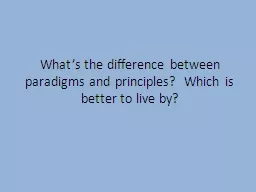PPT-Four Principles of Assessment
Author : olivia-moreira | Published Date : 2017-05-17
Principle number one What is authentic assessment When something is authentic what is it What is the opposite of authentic What kinds of assessment are NOT authentic
Presentation Embed Code
Download Presentation
Download Presentation The PPT/PDF document "Four Principles of Assessment" is the property of its rightful owner. Permission is granted to download and print the materials on this website for personal, non-commercial use only, and to display it on your personal computer provided you do not modify the materials and that you retain all copyright notices contained in the materials. By downloading content from our website, you accept the terms of this agreement.
Four Principles of Assessment: Transcript
Download Rules Of Document
"Four Principles of Assessment"The content belongs to its owner. You may download and print it for personal use, without modification, and keep all copyright notices. By downloading, you agree to these terms.
Related Documents














